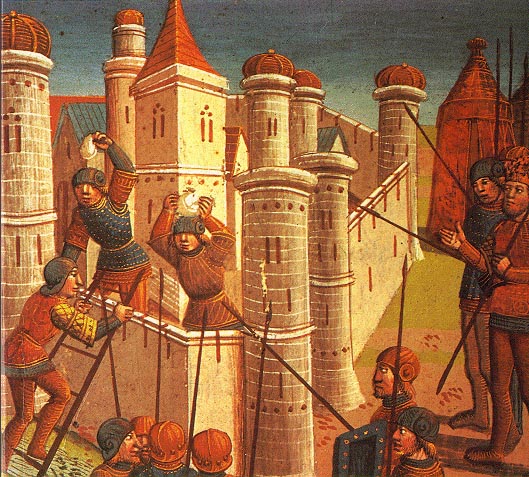Goodbye Constantinople February 7, 2015
Author: Beach Combing | in : Ancient, Medieval , trackback
***Some might like to listen to the very topical Strange History theme song while reading this, thanks to Chris S for the tip***
The night of 28 May 1453 the Emperor of Byzantine, Constantine, ‘the eleventh of his name’, went for a ride with his friend, George Sphrantzes, on the city walls of Constantinople, the last evening, as it happened, that they were to spend together. The city had been around for over a thousand years: in fact, this was close to its 410,000 day. Yet the 28 May 1453 was to be the most dreadful night of all. Constantine and his small party riding along the massive ramparts were staring out at the fires of perhaps eighty thousand Turkish soldiers, who had been camped outside for fifty two days: ten times more soldiers than manned the defences. There are defeats and defeats. But what was to come in the next hours – the final attack would begin at second cock crow – was not the loss of a battle or even of a war, it was the end of a civilization. The Byzantines may have spoken Greek, and they may have been living a generation before Columbus crossed the Atlantic, but they referred to themselves as Romanoi and they believed that they were Cicero’s Rome floating immaterial through the centuries. Gibbon called the great Christian procession behind the walls that evening, as the population prepared for its Armageddon, ‘the funeral oration of the Roman Empire’. There is romanticism in his phrase, but there is also some silver, stickleback flicker of truth and remember that many of these Romanoi would be murdered or enslaved in the coming days, as their beloved Constantinople was recast into a Muslim capital.
Constantine was one of those who died or at least who almost certainly died in the storming of his hometown. On the evening of the 28 he had given speeches to his army, and those Italians who had come to help defend the undefensible, promising defiance and the chance of victory were they all to keep their nerve. He had visited Hagia Sophia for the last time to pray, the last night that that building would function as a church: did he perhaps ask forgiveness there for the lies he had told his warriors just minutes before? He had bid farewell to his household in his palace: and here he seems to have been franker about the chances of success. Sphrantzes, who was with him says that even men made of stone or wood would have wept as the Emperor asked pardon of all those he had wronged. He had gone to the walls to watch the enemy lines, the scene glimpsed above, then up a tower at Caligaria, where, at first cock’s crow, he could hear the preparations for the attack: how dreadful that bird’s call must have been to the Christian defenders. At second cock’s crow, as the attack began, Sphrantzes saw his Lord for the last time, ride off to join the melee, with the imperial purple flowing from his shoulders. Constantine must have died in the conflagration, but there is no reliable account of his killing: just contradictory rumours (cowardice, bravery, decapitation, suicide), some even claiming he escaped. The lack of a final resting place for Constantine, the Marble Emperor, has led to a series of impossible legends fitter for King Arthur than for the last of Augustus’ successors. But there is something pleasing in the uncertainty, as if Istanbul, as it would become, had absorbed him into its bowels and ultimately into its substance.
Other WIBT and hinge moments: drbeachcombing AT yahoo DOT com
This episode always reminds Beach of Julian in the Desert.



